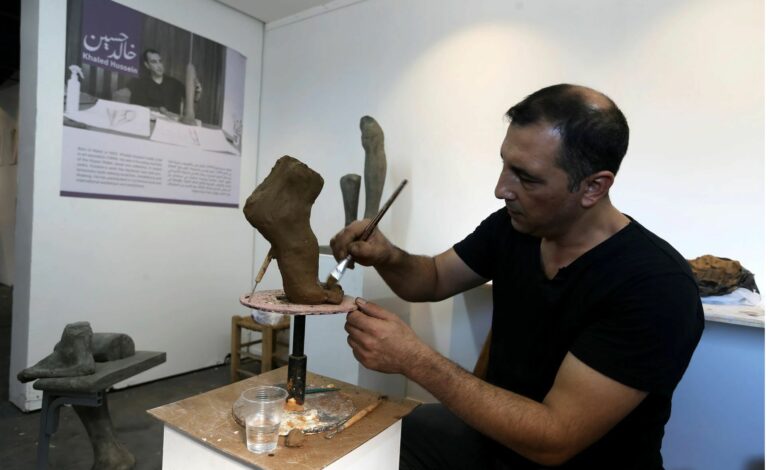
GAZA, Oct 5 (Reuters) – Palestinian artist Khaled Hussein’s sculptures of human limbs are on display in a Gaza exhibition he calls “I Miss You Very Much”, inspired by the loss felt by amputees, including victims of the conflict with Israel.
“There’s a great number of amputees everywhere. It has become a phenomenon, so I wanted to work on this issue and reflect it artistically,” Hussein, 46, told Reuters.
The International Committee of the Red Cross said in 2019 there were at least 1,600 amputees among Gaza’s population of two million people.Assalama Charitable Society, which cares for wounded and disabled people, said 532 Gazans had lost limbs in the conflict.
Seven of Hussein’s sculptures of limbs went on display this month in a Gaza art gallery. The life-sized sculptures are made from clay and then cast in other materials such as bronze or concrete, and create a haunting image in the small gallery space.
One shows two legs standing side by side, the big toe of one curled gently over the other foot. Another shows a naked foot poking out from under a rug lain over a calf.
A leg depicted beside a mirror is a reference to a therapy technique that uses vision to treat pain amputees can feel in their missing limbs.
Hussein’s work is intended in part to draw attention to the suffering of those injured in protests in 2018 and 2019 at Gaza’s border with Israel, which imposes tight restrictions on the territory run by the Islamist Hamas militant group.
Palestinian health officials said at least 200 people were killed and thousands wounded by Israeli forces in the demonstrations. U.N. investigators said more than 120 people had a limb amputated. Israel said its troops opened fire to protect the border from incursions and attacks by armed militants.
But the work explores the loss of a limb regardless of the cause. One of his sculptures depicts the left leg that Ahmed Abu Daqen, 21, lost in a car accident as a child.
“I didn’t expect that someone would take what I had lost as an inspiration and turn it into an artwork that documents it to the world,” said Abu Daqen, who plays on an amputees’ soccer team. “I showed the community that I have ambitions and dreams and I can make them happen.”
Writing by Nidal Almughrabi Editing by Jeffrey Heller and Peter Graff




